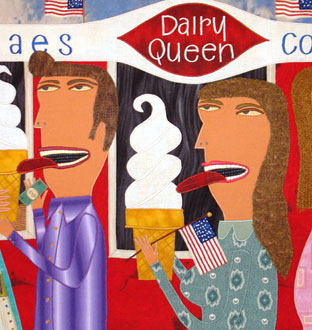
Memorial Day Weekend, by Chris Roberts Antieu, http://www.antieaugallery.com/art-collections/americana-collection/
How do you do it? . . .
. . . People often say. How can a therapist sit with people who are in pain, hour after hour, day after day, and concentrate on how to help them feel better, while keeping themselves balanced?
I usually say, “Tons of self care.” And that’s true. To break it down a bit, I need good sleep and exercise, clean food and daily meditation time, creative outlets galore. But there’s another piece I haven’t written much about. My tribe. Without a tribe of mutual support, all the green juice in the world won’t make me effective at helping people.
If you’re a helper, you need a tribe. Our close, inner circle keeps us balanced, supported, and in touch with reality. In fact, Relational-Cultural Theory posits that isolation is a major source of suffering on all levels: individually, culturally, and globally. I think therapists are especially vulnerable to invisible forms of isolation . . . which is why we need our own support group.
My tribe has three parts.
- My Go-To People: I have a couple of seasoned clinical colleagues to whom I go on a regular basis to talk about stuck spots, mysteries, ethical dilemmas, and stressful conundrums in therapy. These people have heard and seen it all, so they’re unruffled by what I bring them. They have boundaries of steel, so they protect the sanctity of our mutual supervisory relationship.
- My Group: I also have a larger cocoon of safety in the therapists, artists, coaches, and teachers who work at my offices. We consult with each other – though we may not always discuss our work directly. We keep tabs on each other, we see each other between sessions, and we have a general knowing about the work we each do behind closed doors. We encourage each other to take time off. We work on our shared space to create beauty. This contact gives us a common culture and companionship in a line of work that would otherwise be isolating.
- My Spiritual Guides: These people do different kinds of work in the world – but we connect on a spiritual or energy level. My minister/shaman friends see things from a broader perspective. So when we talk about our lives, I naturally get something I can use to see my clients differently. We might sit out under the trees and talk about the meaning of existence, consciousness, and universal wisdom. I emerge from these visits with more clarity about why I do what I do. The older I get, the more I quote these spiritual mentors/friends in therapy. People in distress seek answers from a bigger picture perspective – not just instructions for how to prevent a panic attack.
Who’s In Your Tribe?
Who helps you get grounded when your world is wobbling? Who listens to your confusion when you don’t know how to be helpful? Which colleagues can you turn to when you’re burned out and overwhelmed? Let me know if I can help you create your tribe.
Like to Subscribe?
Get notified when Deborah shares new ideas, art, and creative health information for you.
You have Successfully Subscribed!
We respect your privacy. No information will be shared.